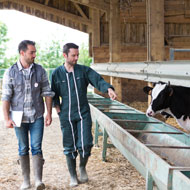
Survey follows concerns about cost and duplication of learning
The BVA is seeking views on the training and revalidation system for Official Veterinarians (OVs).
The move follows concerns that frustration with the current system could increase capacity and capability issues in this critical section of the workforce.
In a short survey that has been emailed to all members, the BVA asks respondents to confirm which OCQ(V)s they currently or have previously held. They are also asked to give reasons if they have chosen to drop a particular qualification without revalidating it.
Amongst the concerns raised about the OV training and revalidation process include cost, time, a lack of relevance and duplication of learning across different modules. The BVA says that it intends to take the data captured in the survey to the APHA and make recommendations for how the system could be improved.
“Official Veterinarians have a critical role to play in upholding high standards of health and welfare across the supply chain, certifying products for export and safeguarding against disease and food fraud. We are already aware that this area is facing significant challenges as Brexit is likely to drive up demand for product certification,” explained BVA president John Fishwick.
“It is particularly worrying to hear that members are finding the system both frustrating and resource-intensive. Losing skilled professionals now at a time when they are needed most would be a real waste of specialist knowledge and could leave gaps in the UK’s provision for responding to disease outbreaks and meeting export certification needs post-Brexit."
He continues: “We understand and support the need to keep veterinary skills up to date, but the process for demonstrating this must be straightforward and proportionate. BVA will ensure that all insights offered by respondents are raised with APHA with the aim of getting the system right for OVs working in the UK both now and in the future.”
The survey will remain open until 29 June 2018 and be accessed at surveymonkey.co.uk/r/7Y2Y3RR



 The Veterinary Medicines Directorate (VMD) is inviting applications from veterinary students to attend a one-week extramural studies (EMS) placement in July 2026.
The Veterinary Medicines Directorate (VMD) is inviting applications from veterinary students to attend a one-week extramural studies (EMS) placement in July 2026.